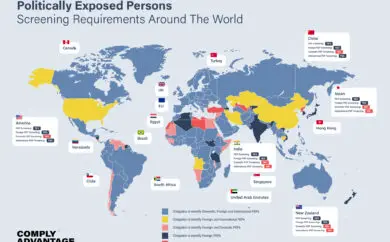
The money remittance industry is growing. In 2018, global remittances reached $689 billion: a figure that is expected to reach $746 billion in 2020. The trend is driven, in part, by digital remittance services, which are expected to see a […]

The money remittance industry is growing. In 2018, global remittances reached $689 billion: a figure that is expected to reach $746 billion in 2020. The trend is driven, in part, by digital remittance services, which are expected to see a […]

Foreign currency exchange (FX) is a popular methodology for money launderers, who seek to exploit a range of vulnerabilities associated with the service. The growing volume of FX businesses across the banking and commercial sectors, on Main Streets and online, […]

Fighting financial crimes committed by political figures starts with identifying them. It’s easy to identify a head of state or key members of a legislature, but there are many politicians in the world who don’t claim a significant spotlight. Screening […]

Banks and other financial institutions (FIs) must implement an anti-money laundering (AML) compliance program to detect and prevent money laundering and terrorism financing activities and satisfy their associated regulatory obligations. Given the administrative burden and the need to manage their […]

Advances in technology have made moving funds to different parts of the world easier than ever and contributed to the growth in money remittance and foreign exchange service providers. The World Bank reports that, between 2008 and 2018, the amount […]

The Philippines is one of the Asia Pacific (APAC) region’s most prominent business destinations and a global hotspot for FinTech and financial services. Ranked as one of Southeast Asia’s favored investment destinations, the Philippines attracted over USD2.44 billion of foreign […]

When elected to prominent political positions or assigned high-profile public roles, individuals should be categorized as politically exposed persons (PEPs) to reflect their increased risk of involvement in money laundering or terrorism financing. Global regulators require financial institutions (FIs) to […]

Domestic PEPs vs foreign PEPs: should they be treated the same? Politicians and other high-profile public officials are especially vulnerable to criminal behavior since they wield significant power and have access to a wealth of resources. Therefore, screening for politically […]

In order to pursue the United States’ foreign policy objectives, the US Treasury has imposed regulations and sanctions on North Korea in some form since 1950. The sanctions have the broad goal of pressuring North Korea to denuclearize but have […]

When compliance teams are designing a customer onboarding journey, firms have to balance their regulatory requirements against budgets, resources, and customer service needs. To do this, businesses should understand their responsibilities during onboarding and the technology tools available to enhance […]

Transaction monitoring can be a challenging compliance obligation: firms must collect and analyze large amounts of customer data to spot potential money laundering activities promptly and accurately. In practice, transaction monitoring involves scrutinizing customer accounts for a range of indicators, […]

Anti-money laundering (AML) transaction monitoring, is an ongoing process used by financial institutions (FIs) to detect and stop money laundering operations. As firms face increasingly sophisticated methods of illicit activity, effective AML transaction monitoring systems are crucial for detecting and […]